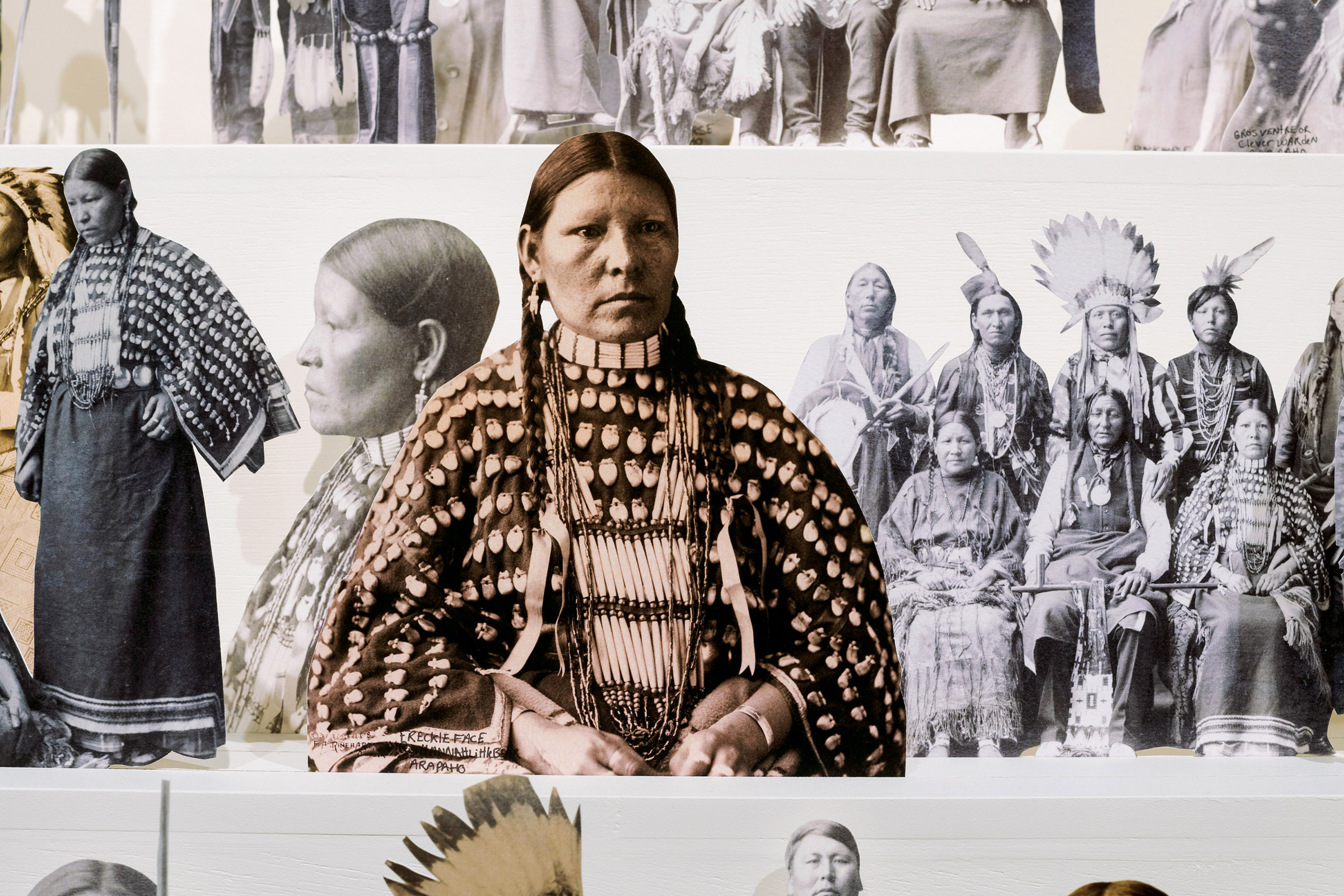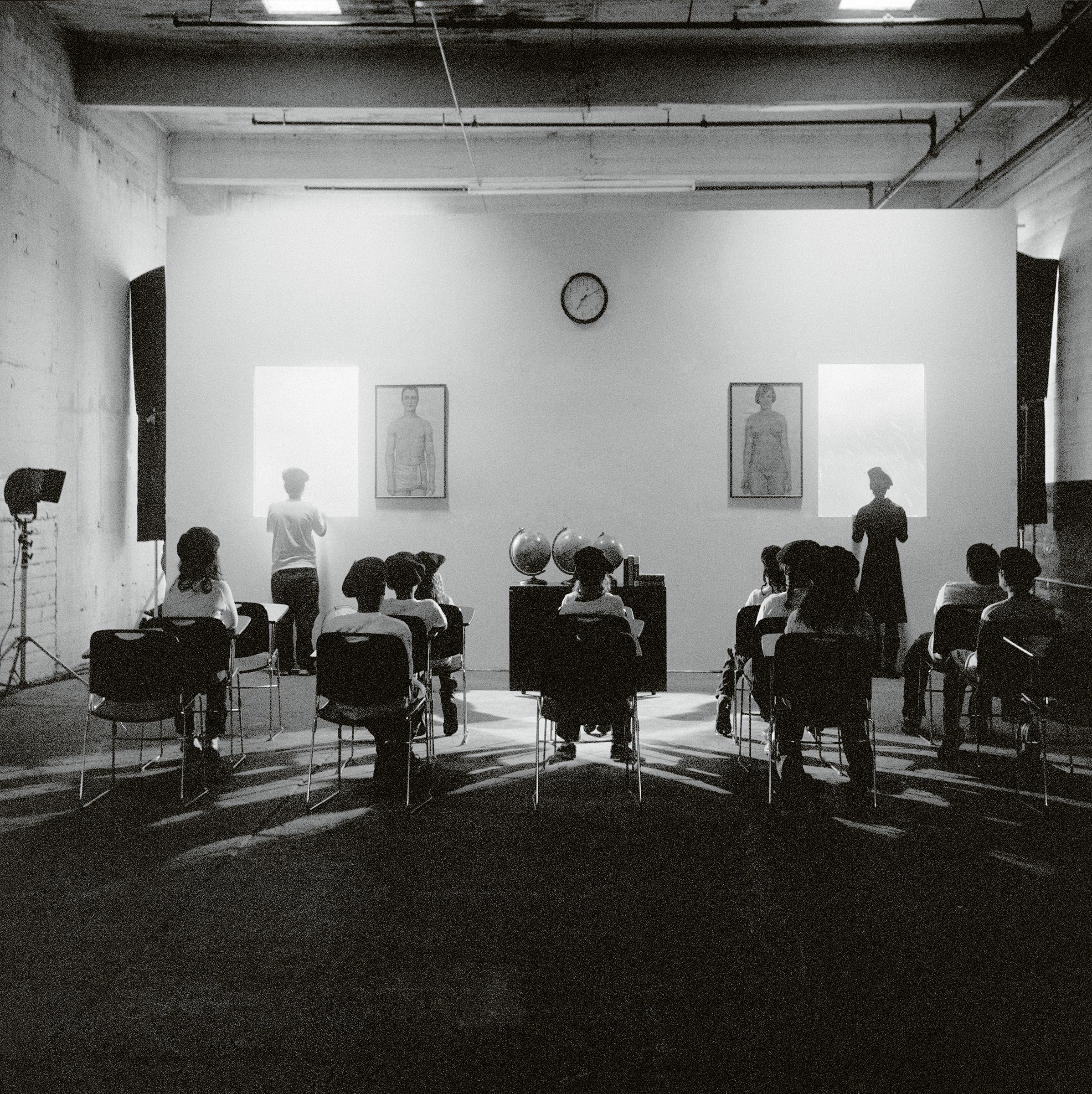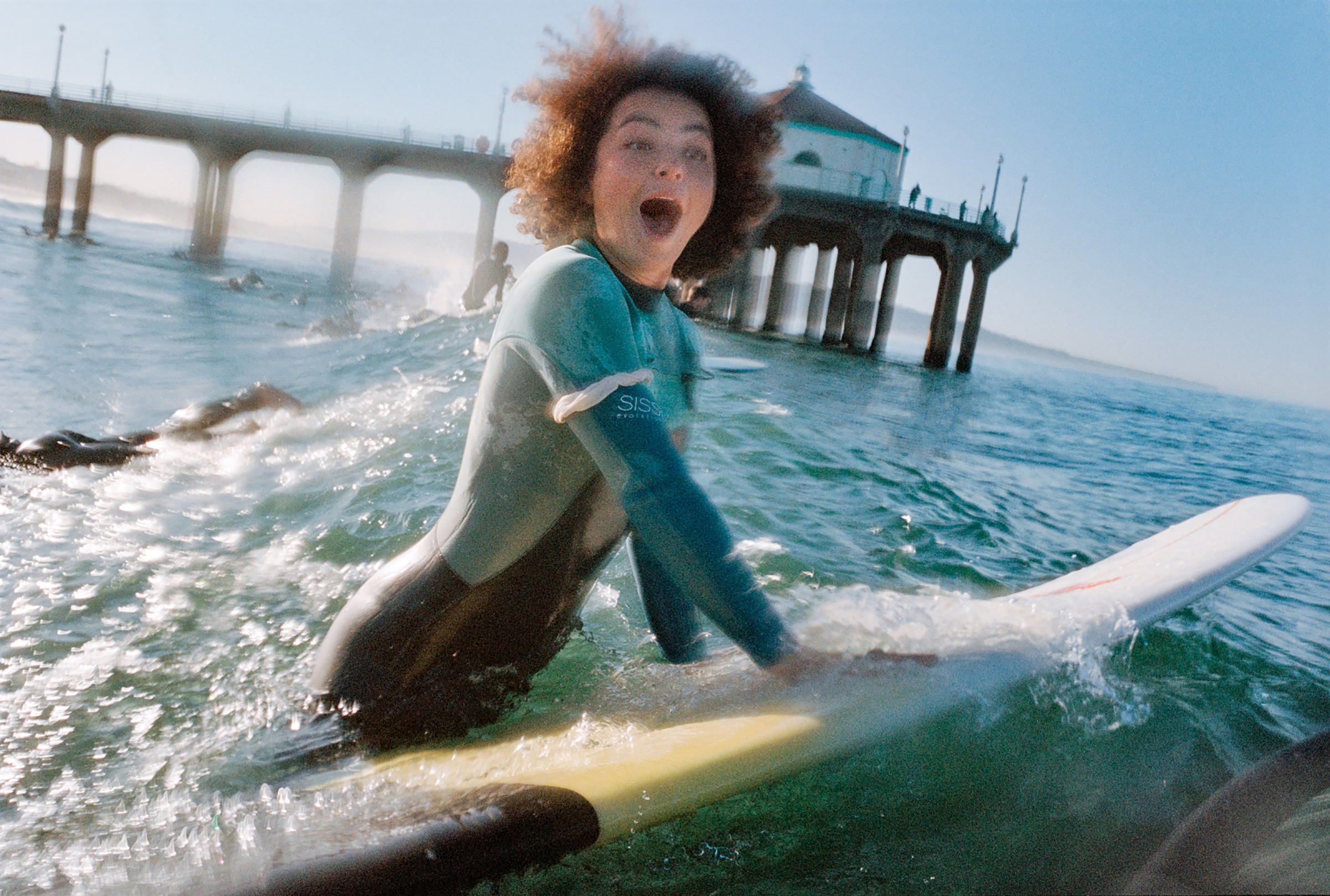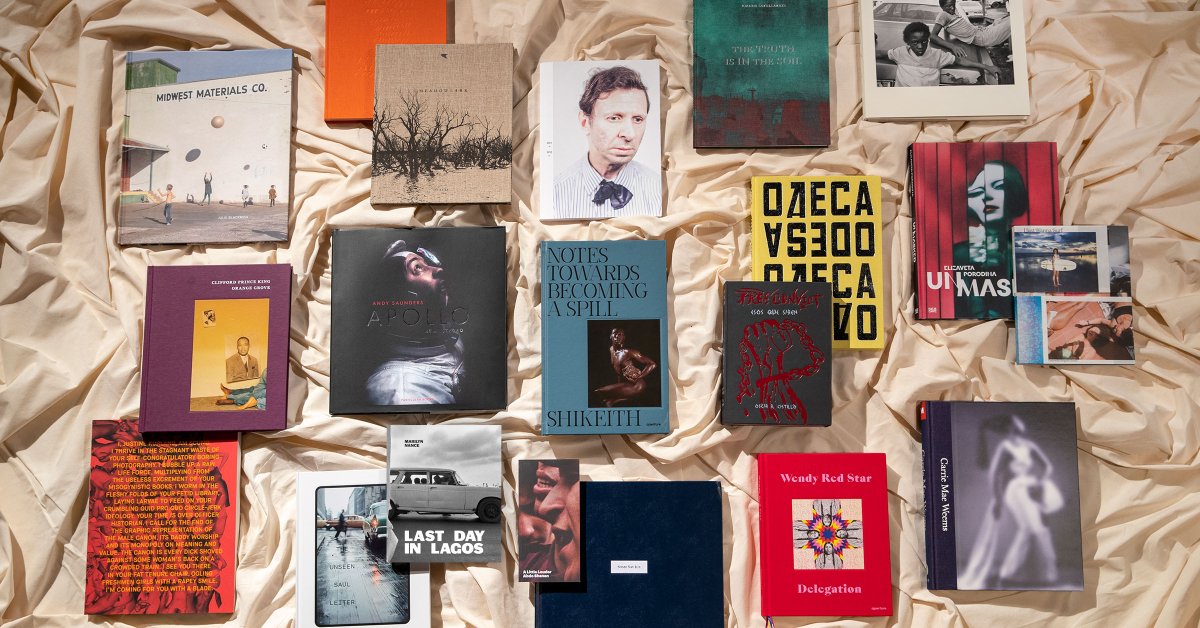This year, the devastating power of photography pervaded our lives—depictions of war in Ukraine, natural disasters caused by climate change, and the memorial of a monarch were everywhere we looked. But where many of those images were unavoidable, photobooks offer the opportunity to step back and consider a selection of pictures in a more intentional setting.
Selected by TIME’s photography editors, this list captures the numerous possibilities of photography and of the photobook form itself. It celebrates the history of photography, in reimaginings of early documents of the medium such as Alessandra Sanguinetti’s Some Say Ice, as well as contemporary innovations in the field from artists like Wendy Red Star and Justine Kurland.
The books below contain something for everyone. Quiet, poetic photographs from Ian Bates find space alongside a grand statement about our universe, in Andy Saunders’ Apollo Remastered. Yelena Yemchuk’s portraits from Odesa, Ukraine, which offer a record of the present, complement Marilyn Nance’s archive of the past. Taken together, they remind us that while photography can show devastation, it also can demonstrate the hope for a better future.—Eli Cohen
Eduardo & Miguel by Ignacio Coló, Editorial RM

In Eduardo & Miguel, Ignacio Coló follows the lives of the titular 53-year-old twin brothers who the photographer discovered one day walking hand in hand through the streets of a Buenos Aires neighborhood. Through bright and playful portraits, quirky details, and the occasional old family photo, Coló tells a story of a deep twin connection, where one cannot do anything without the other. Their bond is rooted in survival, but each brother maintains a unique sense of self. With its simplicity and thoughtful sequencing, Eduardo & Miguel is an intimate look at the love between two siblings.
Buy now: Eduardo & Miguel
The Truth is in the Soil by Ioanna Sakellaraki, GOST Books


In the years following her father’s death, Ioanna Sakellaraki photographed her exploration of a grieving ritual performed in Greece, known as moirologia, and her experiences with its practitioners. The Truth is in the Soil documents the last vestiges of this dying cultural form, placing portraits of the aging women moirologists alongside mixed-media interpretations of mourning. As the artwork becomes more abstract, Sakellaraki’s somber images leave a lasting impression of people negotiating the reality of death.
Buy now: The Truth is in the Soil
Delegation by Wendy Red Star, Aperture


Wendy Red Star’s The Indian Congress, from the series Indian Congress, 2021.
Courtesy of Joslyn Art Museum, Colin Conces
Wendy Red Star’s first monograph is an invitation to witness a photographic artist navigating her personal experience and mining historical material to challenge the portrayal of Native Americans throughout history. The Apsáalooke (Crow) photographer experiments with collages, family photos, interpretive archiving, and installations, as well as self-portraiture, with a playful wit and boundless curiosity. Including the photographer’s work from 2006 to the present, Delegation pokes fun at stereotypical portrayals of Native individuals in mainstream culture while also encouraging viewers to reflect on missing pieces in their own knowledge.
Buy now: Delegation
Baldwin Lee by Baldwin Lee, Hunters Point Press


Between 1983 and 1989, Baldwin Lee, a first-generation Chinese American, documented the American South on a series of road trips. Lee focused his lens on the lives of Black Americans, creating an archive of nearly 10,000 photographs that include collaborative portraits and wide landscapes. Baldwin Lee, the monograph edited down to 88 photographs by Barney Kulok, took the photography world by surprise this year. Many were seeing Lee’s timeless and moving body of work for the first time. Lee’s photographs take on the classic photographic qualities of his teachers Minor White and Walker Evans. In an interview with Jessica Bell Brown featured in the book, Lee said, “Looking is a two-way street. Not only is the photographer looking, but the potential subject is looking too. What the subject sees carries great weight.” Baldwin Lee makes clear that there is a shared balance of looking between Lee and those in his photographs.
Buy now: Baldwin Lee
Un/Masked by Elizaveta Porodina, Hatje Cantz Verlag


Elizaveta Porodina’s Un/Masked is a trove of rich surrealist images steeped in beauty and symbolism. Comprising both personal work and fashion commissions—from everyday images of her peers in Germany to the biggest names in entertainment—Porodina’s photography feels singular in the way she imagines, investigates, and celebrates human behavior. Previously a clinical psychologist, Porodina has a vision and voice that come through in highly crafted images, fantastical and haunting all at once.
Buy now: Un/Masked
Odesa by Yelena Yemchuk, GOST Books


Yelena Yemchuk’s Odesa chronicles a photographer’s love for the Ukrainian port city, its inhabitants, and their spirit. A native of Ukraine, Yemchuk focuses on the city’s youth with intimate wonder in this body of work, which includes photographs she made from 2014 to 2019 amid Russia’s annexation of Crimea. Portraits of young Odesans dressed in military gear are woven alongside images of youth navigating romance, joy, and pain. They display both the strength and the nostalgia of the residents of a city in flux. Accompanied by arresting poetry from Ilya Kaminsky, Odesa celebrates the resilience of Ukrainian people with tenderness and care.
Buy now: Odesa
A Great Turn in the Possible by Carrie Mae Weems, D.A.P./Fundación MAPFRE


Carrie Mae Weem’s A Class Ponders the Future, from the series Constructing History, 2008.
Courtesy Jack Shainman Gallery, New York and Galerie Barbara Thumm, Berlin.
A Great Turn in the Possible is a sweeping retrospective from the artist Carrie Mae Weems. From her seminal series Kitchen Table, where Weems examines the role of a woman (herself) in the kitchen, to her large-scale presentations of Untitled (Colored People Grid) consisting of tinted portraits of Black youths and overlays of color, this book covers Weems’ multi-genre practice that grapples with themes of class, power, gender, belonging, and the lived experiences of African Americans. In the five essays and 40 projects included, you’ll find the foundation of a career that continues to influence a new generation of photographers.
Buy now: A Great Turn in the Possible
Midwest Materials by Julie Blackmon, Radius Books


For two decades, Julie Blackmon has depicted a fantastical world of playfulness, rambunctiousness, and ominous uncertainty through her carefully staged, satirical photographs of children. In her third monograph, Midwest Materials, Blackmon challenges the mundane narrative of everyday life in her native Missouri through her most imaginative photographs yet. Blackmon asks us to approach these images like puzzles, inviting us to scan them for hidden details that are sure to induce a smidgeon of anxiety and unease. Her book is a welcome departure from reality, and for a moment, a reminder of our own, carefree inner child.
Buy now: Midwest Materials
Apollo Remastered by Andy Saunders, Particular Books


For almost half a century, the original NASA photographic film of the Apollo missions was stored in a frozen vault. But in Apollo Remastered, imaging specialist Andy Saunders takes care to introduce newly enhanced and crisp versions of the original photographs from the missions. Saunders also enhances film from a 16mm “movie” camera through implementing a complex imaging-stacking principle. By pairing stunning images from the moon’s surface with stills from within the spacecraft, Saunders presents a rare look inside these journeys to the moon. The result is an immersive experience that not only captures behind-the-scenes moments, but restores them for future generations.
Buy now: Apollo Remastered
SCUMB Manifesto by Justine Kurland, MACK Books


Valerie Solanas’ 1967 book SCUM (Society for Cutting Up Men) Manifesto argues that men have ruined the world and it is women’s job to fix it. Justine Kurland uses this idea to inform her new photobook, SCUMB (Society for Cutting Up Men’s Books) MANIFESTO, which seeks to disrupt and eliminate the male monopolization of the photographic canon. Kurland does this by cutting images from 150 books by straight, white men, taken from her own personal library, and reconfiguring them to create elaborate new collages. Kurland utilizes the art of collage to destroy any understanding of the original photographs and quite literally carve out space for women artists. From the all-caps text on the cover to the dozens of collages of women’s bodies, homes, cars, and other objects, Kurland makes a bold reclamation of narrative and power.
Buy now: SCUMB Manifesto
The Unseen Saul Leiter by Saul Leiter, D.A.P.


The Unseen Saul Leiter brings together a collection of largely unseen archival images from the late Saul Leiter, one of the first photographers to truly capture New York City in color. Curated by Saul Leiter Foundation co-directors Margit Erb and Michael Parillo, Unseen includes 76 images, chosen from over 10,000 taken between 1948 and 1966, paired with personal stories from Erb and Parillo that offer a look inside their process and personal relationships with Leiter. The edit of images flips between bursting color and gloomy weather in the streets of New York, illuminating the in-between moments that were tucked away years ago, but important to Leiter nonetheless. It is a revelatory and colossal archival project that allows even Leiter’s enthusiasts to discover him all over again.
Buy now: The Unseen Saul Leiter
Notes towards Becoming a Spill by Shikeith, Aperture


In his first monograph, Shikeith strings together intimate studio portraits that highlight Blackness and masculinity. The work seeks to visualize eroticism, vulnerability, tenderness, and joy. Replicating the texture of sweat and tears on Black male subjects, Shikeith’s striking photobook unpacks the complex history of desire while exploring a contemporary narrative of Black masculinity.
Buy now: Notes towards Becoming a Spill
I Just Wanna Surf by Gabriella Angotti-Jones, MASS Books


Kimiko Russell-Halterman, a surfer and waterwoman, pops up over a wave during the Black Sand paddle out near the Manhattan Beach Pier in Los Angeles, Feb. 2021.
In I Just Wanna Surf, Gabriella Angotti-Jones embarks on the revolutionary act of spotlighting Black joy in the two years after the murder of George Floyd. Angotti-Jones’ photobook challenges societal norms by photographing the raw and intimate moments of Black women and non-binary surfers, participants in a sport where the predominance of white men often crowds out images of others who enjoy and excel at it. Angotti-Jones’ work is a visual cultural celebration that enriches the archives of the Black American experience through warm and dynamic photography.
Buy now: I Just Wanna Surf
A Little Louder by Abdo Shanan, Editorial RM/Trobades & Premis Mediterranis Albert Camus


When he began photographing the Hirak protests that shook Algeria in 2019, Abdo Shanan felt conflicted about his role in the movement. “Am I a citizen, or am I a photographer?” Shanan recalls in A Little Louder, his photobook documenting the early months of the protests and the ensuing years as unrest unseated longtime president Abdelaziz Bouteflika, leading to ongoing social upheaval. A compact book, A Little Louder’s pages are crowded with images, the photographs often bleeding into one another. Throughout, Shanan makes a grand and open-ended statement on the possibilities of protest. “We have to convince ourselves,” he writes, “that with small gestures we can make significant progress.”
Buy now: A Little Louder
Last Day in Lagos by Marilyn Nance, CARA/Fourthwall Books


Marilyn Nance/Artists Rights Society (ARS), New York
Marilyn Nance’s Last Day in Lagos chronicles the 1977 Second World Black and African Festival of Arts and Culture, also known as FESTAC ’77, which brought together more than 15,000 artists, intellectuals, and performers from 55 nations in Lagos, Nigeria. Nance served as a photographer for the U.S. contingent of the North American delegation and created one of the most comprehensive photographic accounts of the month-long festival. Her photographs showcase the cultural importance of this event on individual and societal levels, as she approached photographing everyone from well-known performers and cultural leaders to festival workers and attendees with the same attentiveness and consideration. Nance’s immersive archive, woven together with writing from various contributors contextualizing the work, make this culturally significant festival accessible to a wide swath of readers.
Buy now: Last Day in Lagos
Orange Grove by Clifford Prince King, TIS books


Clifford Prince King’s debut monograph is a considered and tender exploration of Black and queer intimacy. This body of work chronicles the period after King moved to Orange Grove in Los Angeles with friend and collaborator Malcolm Marquez. During that time, King used their home as a backdrop for portraits of friends and lovers. The domestic interiors, warm tones, and overlapping bodies in King’s photographs contribute to a vision of a safe haven and a space of shared vulnerability. The work also references King’s 2018 HIV diagnosis, showing how these various realities and identities live in harmony with one another.
Buy now: Orange Grove
Some Say Ice by Alessandra Sanguinetti, MACK Books


Alessandra Sanguinetti first came across Michael Lesy’s 1973 book Wisconsin Death Trip as a child growing up in Argentina. She was moved by the notion of mortality at work in the book’s photographs, made by Charles Van Schaick at the turn of the 20th century in Black River Falls, Wisconsin. Decades later, Sanguinetti visited Wisconsin to recapture Van Schaick’s perspective. While specific in its vision, the resulting series, depicted in stark black-and-white photographs, is an expansive and imaginative meditation on a small town from an outsider’s view.
Buy now: Some Say Ice
We Don’t Say Goodbye by Lorenzo Meloni, GOST Books


For 10 years, Lorenzo Meloni covered the rise, reign, fall, and immediate aftermath of the Islamic State in Iraq, Syria, and Libya. In his new photobook, Meloni showcases his unique approach to conflict photography, which urges the reader to remove their preconceived notions of war to view it through a more holistic lens. The cover of We Don’t Say Goodbye, a replica of graffiti from inside Raqqa prison, where one inmate marked 100 days in detention, sets the tone for the rest of the book: It places the reader in a prison cell. Meloni urges us to expand our imagination and set aside biases about war before he even introduces the first photograph.
Buy now:We Don’t Say Goodbye
Meadowlark by Ian Bates, Deadbeat Club


Initially inspired by the Western Meadowlark bird, photographer Ian Bates spent years traveling through the American West with his camera. Bates presents photographs from that time in his photobook Meadowlark, and pairs them with Jim Harrison’s poem “I Believe,” which speaks to everyday things, humans and nature coexisting in simplicity. The Meadowlark bird, which some believe symbolizes abundance and good fortune, only appears once in Bates’ book as a painted depiction. But the calmness and the loneliness of the entire collection are palpable, and a necessary reminder that there is beauty in the simplicity of the world that Bates captures.
Buy now: Meadowlark
ESOS QUE SABEN (Those who know) by Oscar B. Castillo, Raya Editorial


Oscar B. Castillo’s Esos Que Saben is the culmination of an 8-year-long project about the General Penitentiary of Venezuela, an “open regime” prison completely run by prisoners, and the lives, hopes, and dreams of the members of Free Convict, a Hip Hop collective developed inside the prison. Castillo weaves together photographs, interviews, drawings, collages, documents, and more to explore the intricacies of the prison system in Venezuela. These photographs capture the individuals’ redemption and resilience as they navigate familial and communal support and relentless cycles of violence. The poetic and chaotic black-and-white photographs draw the viewer in, while the personal family photographs, drawings, writing, and interviews from the Free Convict members add depth, creating a holistic and human view inside these prisoners’ lives.
Buy now: ESOS QUE SABEN (Those who know)
More Must-Reads From TIME



